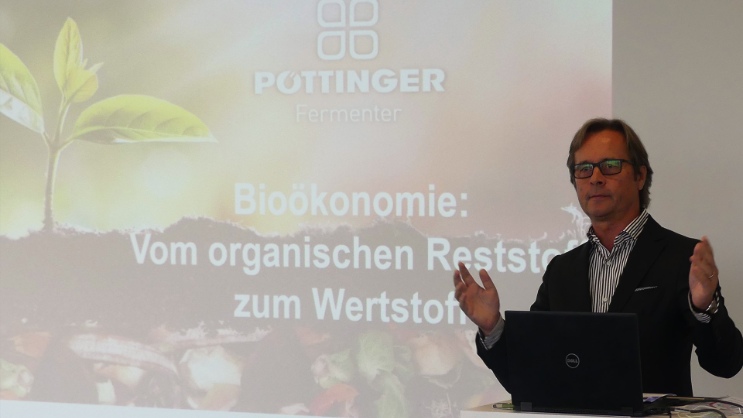Dry fermentation contributes to bio-economy development
Environmentally responsible use of natural resources is one of the major challenges of our age. The "Alpine Biotechnology Workshop", held at Business Upper Austria in Linz on 17 October, therefore took a closer look at the bio-economy. Dr Guntram Bock, Managing Director of PÖTTINGER Fermenter, was also invited to the event as a guest speaker.
Numerous companies and experts attended the "Alpine Biotechnology Workshop", organised by Cleantech Cluster at Business Upper Austria in Linz on 17 October, to discuss their experiences and share information from various sub-sectors of the bio-economy, while pointing towards specific measures for a bio-based economy in Austria.
Development of a bio-economy strategy serves as a beacon to the Climate and Energy Strategy 2030 launched by the Austrian Federal Government in May 2018. The objective of the bio-economy is to reduce fossil fuel and energy consumption, thereby replacing fossil-based materials with renewable ones. During the event, stakeholders from bio-based industries had the opportunity to network and discuss both the opportunities and the potential challenges that could speed up or slow down transition from a fossil-based to a bio-based economy.
Particular importance was attached to examples of best practice, as these promise rapid implementation of climate and resource-conserving measures and can be incorporated directly into an action plan. Within this context, Dr Guntram Bock, Managing Director of PÖTTINGER Entsorgungstechnik, presented dry fermentation in fully enclosed systems. Using this method, biogas production is emission-neutral, regardless of the weather or season, and achieved exclusively from biogenic waste such as municipal organic waste, green waste, manure, straw, household organic waste, etc. Due to the fully enclosed system, neither Co2 nor methane escapes during the fermentation process but is contained and collected directly on-site. Besides biogas, another valuable end product is raw compost that can be used to benefit soil recovery – wholly in line with a recycling infrastructure and a sustainable energy and climate concept.

